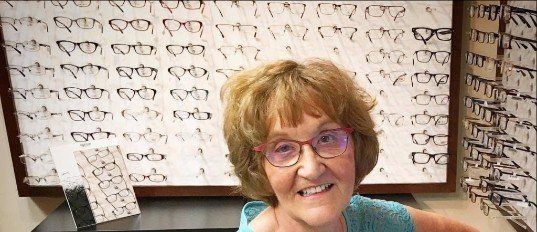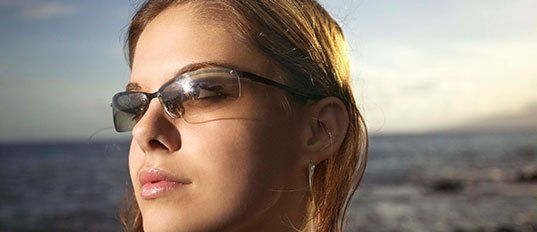Billing Policy Form
Patient Forms - Woodstock
Patient Forms - Lake Geneva
HIPAA Notification of Privacy Practices
Blink Exercises Form
Afterhours Medical Eye Emergency: (815)-575-9250
Woodstock: (815) 338-0674
Lake Geneva: (262) 248-4878
Lenses, Frames, Sun Wear
Top-Of-The-Line Eyewear
- Exclusive Family Eye Care Brands Available- Member of the American Optometric Association- Se Habla Español
Motivating Factor OneMotivating Factor TwoMotivating Factor Three
Find the Lenses That Are Right for You
Contrary to popular belief, your lens selection should be made before your frame selection. The lenses are the most important part of eyewear as they fulfill the objective of providing better vision. Lens selection affects the cost of your eyewear. Your lenses are the gems of your chosen setting — your frame.
The doctor will provide you with a suggested choice of lens features, including the material of the lens, design and surfacing of the lens, tints, and other lens features such as scratch resistant (S/R), anti-reflection (A/R), ultraviolet protection (UV), coatings, and edge treatments.
Your prescription determines how thick your lenses must be, what shape they are, and how heavy they are on your face. The professional optician at Family Eye Care of Woodstock and Lake Geneva will assist you in choosing a frame that will work well with your lenses.
Source: Optical Laboratories Association
A Wide Array of Stylish and Functional Frames
When choosing a frame, consider comfort, cosmetic appeal, and how your lenses will fit in the frame. When making the investment in eyewear, it is to your advantage to have a professional optician assist you.
Buying a frame without trying it on to check whether it fits your lenses and your face might mean money misspent.
We guarantee a proper fit and satisfaction with your purchase. A one-year warranty is included with your purchase of new frames. If you prefer to use your own frame or purchase a discontinued frame, we cannot warranty the frames. However, we offer a warranty on the lenses.
Family Eye Care of Woodstock and Lake Geneva offer a wide selection of women's, men's, and children's premium frames and designer frames that cannot be found at the average retail store or online.
General Guidelines to Follow When Choosing Frames
- The frame's front width should be approximately the width of your head
- Eyes should be positioned in the central part of the frame's front eye wire
- For plastic frames, the bridge shape should contour to the nose shape
- Adjustable pads should provide even pad contact on the nose
- The temple length should allow a temple bend length of 1" to 1.25"
We Offer Exclusive Designer Family Eye Care Brands
- Nike
- Maui Jim
- Scott Harris
- Silhouette
- Cinzia
- Fysh
- Dolabany
- Plume Paris
- Michael Ryen
- db4k
- OGI
- Armani
- Seraphin
- Columbia
- Vera Wang
- Nine West
- Alain
- Kliik
- Cote D' Azur
- DB+
- Flexon
- Modern
- Super Flex
- XXL
- BMEC
- Paradigm
- Elasta
- Bruizzant
- Crocks
- Rio Ray
- Invu
- Alan J
Protect Your Eyes from Solar Radiation
The sun's primary danger is in the form of ultraviolet (UV) radiation. Artificial sources like welding machines, tanning beds, and lasers can also produce UV radiation.
Most people are aware of how harmful UV radiations are to the skin. However, many may not realize that UV radiation can harm the eyes and other components of solar radiation can also affect vision.
There are three types of UV radiations. UV-C is absorbed by the ozone layer and does not present any threat. However, UV-A and UV-B radiations can have long-term and short-term negative effects on the eyes and vision.
If your eyes are exposed to an excessive amount of UV radiation over a short period of time, you will experience photokeratitis. Like a “sunburn of the eye," photokeratitis can be painful. Its symptoms include red eyes, a foreign body sensation or gritty feeling in the eyes, extreme sensitivity to light, and excessive tearing.
Fortunately, these symptoms are usually temporary and rarely cause permanent damage to the eyes.
The longer the eyes are exposed to solar radiation, the greater the risk of developing cataracts or macular degeneration later in life. It is not clear how much exposure to solar radiation will cause damage.
Therefore, whenever you spend time outdoors, wear quality sunglasses that offer UV protection and a hat or cap with a wide brim. Also, certain contact lenses can provide additional UV protection.
To provide adequate protection for your eyes, sunglasses should:
- Block out 99 to 100 percent of both UV-A and UV-B radiation
- Screen out 75 to 90 percent of visible light
- Have lenses that are perfectly matched in color and free of distortion and imperfection
- If you participate in potentially eye-hazardous outdoor work or sports, your sunglass lenses should be made from polycarbonate or Trivex® material. These lenses provide the most impact resistance.
If you spend a lot of time outdoors in bright sunlight, consider wearing wraparound frames for additional protection from the harmful solar radiation.
Don't forget protection for children and teenagers. They typically spend more time in the sun than adults.
Protect Your Eyes from Shorter-Wavelength Visible Light
Chronic exposure to shorter-wavelength visible light (blue and violet light) may also be harmful to the retina. Many digital devices emit this shorter-wavelength visible light.
Blue light is part of the visible light spectrum. Some types of blue light can be beneficial, helping us regulate our bodies' internal biological clocks.
However, blue-violet light can be harmful to the eyes, specifically the retina. It is a risk factor for the onset of age-related macular degeneration, a deterioration of the part of the retina responsible for sharp, central vision.
A recent study found that Americans spend almost 2 ½ hours on their tablets and smartphones every day. In addition, most offices and stores use fluorescent light bulbs and LED lights are becoming increasingly popular.
Lenses that absorb harmful blue light but allow beneficial blue light through your lenses are entering the marketplace. You could also apply a special clear coating to traditional lenses to enhance their ability to block these harmful rays while you use computers and smartphones.
UV Radiation Checklist
- Do you spend a great deal of time outdoors?
- Do you spend time skiing, mountain climbing or at the beach?
- Do you use a sunlamp or tanning parlor?
- Do you spend time in the mountains or the U.S. Sunbelt?
- Are you a welder, medical technologist, or do you work in the graphic arts or in the manufacture of electronic circuit boards?
- Have you had cataract surgery in one or both eyes?
- Do you take prescription or over-the-counter drugs that can increase your sensitivity to UV radiation (If you are unsure, check with your optometrist, pharmacist, or physician)?
- Have you had cataract surgery in one or both eyes?
See your doctor of optometry at Family Eye Care of Woodstock and Lake Geneva every year for a comprehensive eye examination.
It is a good way to monitor your eye health, maintain good vision and keep track of your solar radiation protection needs, as well as advances in eye protection.
Satisfaction is guaranteed with lenses and frames. Contact
us today to learn more. Our professionals can also speak Spanish.
Exclusive Designer Styles You Can Only Find With Us
Come see our large collection of frames today!
(262) 248-4878
(815) 338-0674
(815) 338-0674
Very thorough eye exam, I was very happy with my new glasses and will be going back for my yearly check soon
- Laura Tobin
Request an Appointment
Thank you, your information has been submitted and we will contact you shortly. If you seek immediate attention please call (815) 338-0674 or (262) 248-4878.
Family Eye Care of Woodstock and Lake Geneva
Oops, there was an error sending your message.
Please try again later.
Please try again later.
Woodstock Hours
Mon 9:00am - 5:00pm
Tues10:00am - 6:00pm
Wed- Fri 9:00am - 5:00pm
Sat-Sun Closed
This is a placeholder for the Yext Knolwedge Tags. This message will not appear on the live site, but only within the editor. The Yext Knowledge Tags are successfully installed and will be added to the website.
Lake Geneva
415 Broad Street Suite 101
835 Geneva Parkway N.
Lake Geneva, WI 53147
Privacy Policy
| Do Not Share My Information
| Conditions of Use
| Notice and Take Down Policy
| Website Accessibility Policy
© 2025
The content on this website is owned by us and our licensors. Do not copy any content (including images) without our consent.




